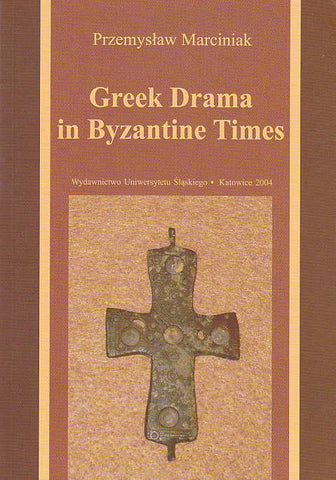Greek Drama in Byzantine Times
45,00 $ was 55,00 $
ISBN: 83-226-1400-4
Description: softcover, 131 pp. (24x16,5 cm)
Condition: very good
Weight: 240g.
Przemyslaw Marciniak, Greek Drama in Byzantine Times, Wydawnictwo Uniwersytetu Slaskiego, Katowice 2004
In this study, the author demonstrates how Byzantine drama functioned in the Byzantine society. Though it was not staged anymore, ancient drama became an important part of Byzantine education, as well as remained an object of research conducted by Byzantine scholars. This, alongside the fact that Byzantine writers employed motifs, quotations and allusions taken from ancient drama, prove that ancient theatre was considered to be an important part of Byzantine self-identification.
Acknowledgements
Introduction
CHAPTER 1
Continuity or Discontinuity - Byzantine Theatre
1.1. Researching Byzantine Theatre throughout the Ages
1.2. The Shift in the Meaning of the Word Geocipov
1.3. Religious Theatre or the Theatre of Religion?
1.4. Liudprand's Testimony
1.5. {Greek script}
1.5.1. Literary Theatre
1.5.2. All the World's a Stage
CHAPTER 2
Ancient Drama in Byzantine Education
2.1. Ancient Drama in Education
2.2. Ancient Drama in Byzantium
2.2.1. Aristophanes vs. Menander
2.2.2. Other Sources
2.3. Higher Education
2.4. The Inalienable Heritage
CHAPTER 3
Perished but not Forgotten: The Byzantines on Greek Dramas and Their
Authors
3.1. Aristophanes
3.2. Euripides
3.3. Sophocles
3.4. Aeschylus
3.5. {Greek script}
3.5.1. Etymology and Origins
3.5.2. Drama as Performance
3.6. Conclusion
CHAPTER 4
Dealing with the Heritage
4.1. Ancient Comedy in Non-Dramatic Texts
4.2. The Christos Paschon - an Unusual Exception?
4.3. Funny Mice
4.4. A Timeless Problem
4.5. Conclusion
A Final Thought
Bibliography
Zusammenfassung

